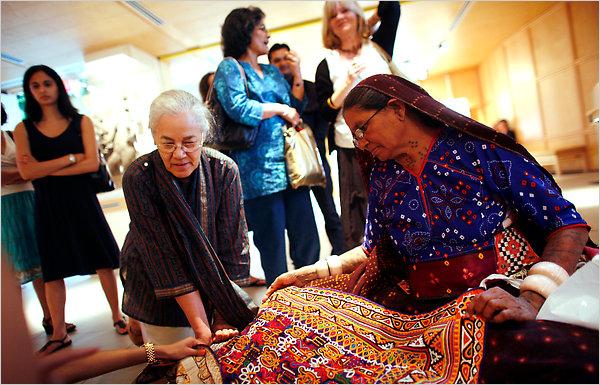Slight, pretty, sharp-eyed, and quietly firm about things - Johanna Kwedhi is Namibia's first female trawler captain. She is a living example of the empowerment of women in Namibia.
Johanna captains the Kanus, one of the largest trawlers operating from Luderitz Harbour, an old port rebuilt for today's fishing boats. It's her responsibility not only to navigate a coastline infamous for shipwrecks, but to bring in a profitable catch.
And this is an industry not used to women being, literally, at the helm.
2010-08-09
Posted in Women Worldwide

She could easily be forgiven for never wanting to see the inside of a hospital again.
In a young life blighted by serious illnesses, Allison John has unwillingly made medical history by becoming the first person in Britain to have all her major organs transplanted.
She received a new liver, kidney, heart and lungs in a series of difficult operations spanning 12 years to tackle the major health problems that at one stage left her just three days from death.
For many, that would be enough contact with the medical profession to last a lifetime. But not for the determined Miss John.
Ever since she was a schoolgirl she had wanted to be a doctor - and now she has finally fulfilled the dream after graduating from medical college.
The 32-year-old, who took 14 years to complete her studies and who will soon begin work on the wards, said yesterday: 'I never thought this day would finally come. It's such a huge milestone for me.
2010-08-09
Posted in Women Worldwide
 Married at 14, the mother of seven, Kakuben Lalabhai Parmar was well into adulthood before she came face-to-face with a man who was not a close relative.
Married at 14, the mother of seven, Kakuben Lalabhai Parmar was well into adulthood before she came face-to-face with a man who was not a close relative.
In the cattle-herding community to which Parmar belongs, one among a cluster of groups categorized by the Indian constitution as “scheduled castes,” women were traditionally bound not just to their region or village but to the home.
“My group was treated as untouchables,” said Ms. Parmar, 50. And if the community was untouchable, its female members were still more disadvantaged by being invisible.
Miraclulously, Parmar’s life was transformed roughly 20 years ago by a not-for-profit organization called Sewa .
“I already experienced the biggest change in my life,” she says, “when I first got the chance to come out of my house and participate in society.”
2010-07-29
Posted in Women Worldwide
Susan notes: as the debate around hijab continues throughout the world, I found this unique perspective, artfully delivered, to be fascinating. Obviously others did as well - it was the Winner of the 2010 Mosquers Video Contest in the social Conscience Category. According to The Mosquers site, it is:
"...a program under the Centre for Race and Culture, its video contest encourages Muslims (and Non-Muslims alike) to “grab a camera and send a message” about Muslims or Islam in Canada. For the last three years, The Mosquers has been very successful in addressing stereotypes and misconceptions about Islam to the media and general public.
By encouraging individuals to use the artistic medium of film/video, young Muslims have been given the opportunity to entertain, educate and decrease stereotypes & misconceptions about Islam in a creative and effective way."
Related links:
More About Hijab On AWR
The Random, The Real, The Inspiration & The Imagination
@natashamoloo
2010-07-23
Posted in Women Worldwide
 The crime? Wearing a miniskirt — in the privacy of a friend's home — in Iran. As protesters increasingly take to the streets to oppose the oppressive regime, Raassi, now a fashion designer in the U.S., describes the punishment that changed her life.
The crime? Wearing a miniskirt — in the privacy of a friend's home — in Iran. As protesters increasingly take to the streets to oppose the oppressive regime, Raassi, now a fashion designer in the U.S., describes the punishment that changed her life.
There’s a memory that has defined my life: I'm standing in line in a long, dark hallway, handcuffed to a friend, while listening to the horrifying sound of two other friends screaming out in pain. I'm in a jail in Iran's capital, Tehran, and I'm about to be served my punishment: 40 lashes. My friends emerge from a room down the hall, tears streaming down their faces and blood staining the backs of their shirts. I can barely breathe as I wait for the guards to call my name. Finally, it's my turn. My friend and I, still cuffed, enter the torture room together.
Two expressionless, middle-aged female guards, each dressed in a chador, or long black robe, remove our cuffs, then instruct us to lie facedown on a pair of bare mattresses. We will be lashed on our backs. The guards grab two black leather whips and dip them in water, to make the lashes sting. I turn my head and see them raise the whips high in the air, then I squeeze my eyes tight, terrified. The first of 40 lashes comes down hard across my back. I feel a shock of searing pain. I'm wearing a cotton T-shirt, which you'd think would be preferable to wearing nothing at all, but I soon learn that it's actually worse. As the lashes come down one after another, the T-shirt starts to stick to the cuts on my back; the whip pulls the shirt away from the welts after each lashing, intensifying the pain. I keep thinking, I can't believe this is happening to me. I'm a good student; I come from a great family. I'm not a criminal.
2010-07-12
Posted in Women Worldwide
 She could easily be forgiven for never wanting to see the inside of a hospital again.
She could easily be forgiven for never wanting to see the inside of a hospital again. Married at 14, the mother of seven, Kakuben Lalabhai Parmar was well into adulthood before she came face-to-face with a man who was not a close relative.
Married at 14, the mother of seven, Kakuben Lalabhai Parmar was well into adulthood before she came face-to-face with a man who was not a close relative. The crime? Wearing a miniskirt — in the privacy of a friend's home — in Iran. As protesters increasingly take to the streets to oppose the oppressive regime, Raassi, now a fashion designer in the U.S., describes the punishment that changed her life.
The crime? Wearing a miniskirt — in the privacy of a friend's home — in Iran. As protesters increasingly take to the streets to oppose the oppressive regime, Raassi, now a fashion designer in the U.S., describes the punishment that changed her life.